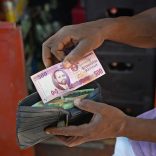Mozambique: Savings deposits grow 15% in one year
Ukraine crisis: Impact on Angola, Mozambique economies – Oxford Economics

File photo: DW
Oxford Economics Africa believes that Russia’s invasion of Ukraine could increase wheat prices in Angola and Mozambique, but the rise in oil and gas prices benefits the finances of these two African countries.
“Both Angola and Mozambique have a very limited level of trade with Russia and Ukraine; Angola imports wheat and yeast from Russia, while Mozambique imports a significant amount of wheat and a small amount of refined oil from Russia,” Oxford Economics Africa analyst who follows these two African economies told Lusa on Sunday.
Read: Diversification of European markets may benefit Mozambique and Angola, says Fitch Solutions
“It appears that, at least for now, Angola is generally benefiting from higher oil and gas prices, which are partially driven by the conflict,” Gerrit van Rooyen said in remarks from Paarl, South Africa.
“Higher oil prices are positive for government revenues and for the value of the kwanza,” the analyst added. If the rise is sustained, “this could increase investment in Angola and lower debt levels faster than previously anticipated”.
“If gas prices remain high due to the conflict, this will be positive for investments in Mozambique’s liquefied natural gas [LNG],” his analysis continues, since “the profits from the natural gas in the Rovuma basin could be greater than the risk of armed extremist insurgency in the region.”
Despite the benefits for the public accounts of the two Portuguese-speaking states, van Rooyen points out that, for the average citizen, the disadvantages outweigh the advantages.
“Higher oil and wheat prices is bad news for consumers, as inflation, which is already high in these countries, particularly in Angola, is expected to increase more than initially expected,” he concluded.
Wheat and yeast are two of Russia’s top exports to Angola and Mozambique, according to data from an economic research centre sponsored by Harvard University. In the case of Angola, they represented more than 30% of purchases from Russia in 2019, followed by stamps and yeast, while in Mozambique, wheat represented more than 75% of imports from Russian, followed by fertilisers, which comprised 18% of the total by value.












Leave a Reply
Be the First to Comment!
You must be logged in to post a comment.
You must be logged in to post a comment.